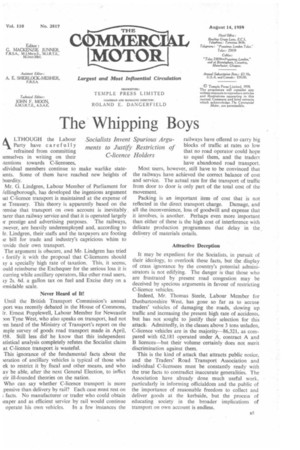The Whipping Boys
Page 39

If you've noticed an error in this article please click here to report it so we can fix it.
LTHOUGH the Labour Party have carefully refrained from committing temselves in writing on their ;tendons towards C-licensees, tdividual members continue to make warlike statetents. Some of them have reached new heights of bsurdity.
Mr. G. Lindgren, Labour Member of Parliament for tellingborough, has developed the ingenious argument tat C-licence transport is maintained at the expense of le Treasury. This theory is apparently based on the remise that transport on own account is inevitably , !..arer than railway service and that it is operated largely tr prestige and advertising purposes. The railways, Dwever, are heavily underemployed and, according to Fr. Lindgren, their staffs and the taxpayers are footing le bill for trade and industry's capricious whim to -ovide their own transport.
The argument is obscure, and Mr. Lindgren has tried fortify it with the proposal that C-licensees should ay a specially high rate of taxation. This, it seems, ould reimburse the Exchequer for the serious loss it is curring while ancillary operators, like other road users, ty 2s. 6d. a gallon tax on fuel and Excise duty on a irmidable scale.
Never Heard of It!
Until the British Transport Commission's annual port was recently debated in the House of Commons, Er. Ernest Popplewell, Labour Member for Newcastle on Tyne West, who also speaks on transport, had not ,en heard of the Ministry of Transport's report on the mple survey of goods road transport made .in April, /58. Still less did he know that this independent atistical analysis completely refutes the Socialist claim at C-licence transport is wasteful.
This ignorance of the fundamental facts about the )eration of ancillary vehicles is typical of those who ek to restrict it by fiscal and other means, and who ay be able, after the next General Election, to inflict eir ill-founded theories on the nation.
Who can say whether C-licence transport is more pensive than delivery by rail? Each case must rest on ; facts. No manufacturer or trader who could obtain leaper and as efficient service by rail would continue operate his own vehicles. In a few instances the railways have offered to carry big blocks of traffic at rates so low that no road operator could hope to equal them, and the traders have abandoned road transport.
Most users, however, still have to be convinced that the railways have achieved the correct balance of cost and service. The actual rate for the transport of traffic from door to door is only part of the total cost of the movement.
Packing is an important item of cost that is not reflected in the direct transport charge. Damage, and all the inconvenience, loss of goodwill and expense that it involves, is another. Perhaps even more important than either of these is the high cost of interference with delicate production programmes that delay in the _ delivery of materials entails.
Attractive Deception It may be expedient for the Socialists, in pursuit of their ideology, to overlook these facts, but the display of crass ignorance by the country's potential administrators is not edifying. The danger is that those who are frustrated by present road congestion may be deceived by specious arguments in favour of restricting C-licence vehicles.
Indeed, Mr. Thomas Steele, Labour Member for Dunbartonshire West, has gone so far as to accuse traders' vehicles of damaging the roads, slowing up traffic and increasing the present high rate of accidents, but has not sought to justify their selection for this attack. Admittedly, in the classes above 3 tons unladen, C-licence vehicles are in the majority--86,321, as compared with 62,181 operated under A, contract A and B licences—but their volume certainly does not merit discrimination against them.
This is the kind of attack that attracts public notice, and the Traders' Road Transport Association and individual C-licensees must be constantly ready with the true facts to contradict inaccurate generalities. The Association have already done much useful work, particularly in informing officialdom and the public of the importance of reasonable freedom to collect and deliver goods at the kerbside, but the process of educating society in the broader implications of transport on own account is endless.




















































































































